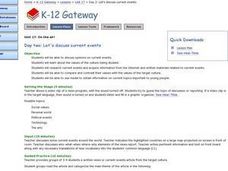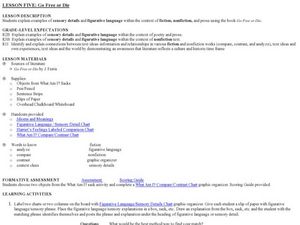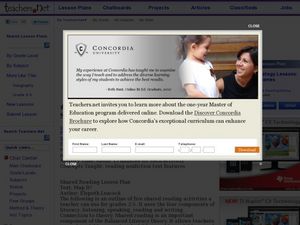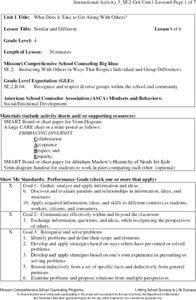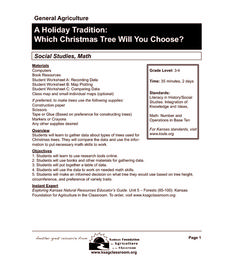Curated OER
Lesson: Stepping into the Past
How have things changed from the past until now? Young art historians examine a screen painted in Mexico during the 1700s. They discuss the differences between a garden party then and now. They then write a journal entry about the party...
Curated OER
Lesson: Cultural Comparisons
A game, research, and cross-cultural comparisons are in the works as you open an artistic lesson. Upper graders get analytical as they make observations that will help them create a link between abstract and creative thinking. They...
Curated OER
Let's Discuss Current Events
Investigate articles from the daily news and share opinions with classmates. Using current events, learners view a news program without sound and predict what news is being discussed by analyzing the visuals. Then they read news articles...
Curated OER
New York State Testing Program: English Language Arts Book 2
Practice listening and writing skills with this resource. This is a test created by the New York State Testing Program. Learners listen to a passage called "Leonardo da Vinci's Mona Lisa" twice and write responses to the selection. They...
Curated OER
The Struggle to End Apartheid
Motivate your class with this worksheet on apartheid. After responding to several pre-reading questions, learners read and mark 2 articles: 1 about the Soweto Uprising and 1 about Nelson Mandela. They then respond to 4 short answer...
Curated OER
Analyzing Messages in Various Media
Explore communication through media by analyzing different advertisements and artwork. Budding artists view videos, websites, plays, and other artistic endeavors while discussing the true meaning of the work with their classmates. They...
Curated OER
Non-Fiction Text Features
Distinguish between textual features of non-fiction in the book The Lewis and Clark Expedition and in the non-fiction story "Ta-Na-e-Ka." Third graders create posters and participate in group discussions to show their...
Curated OER
Go Free or Die: Figurative Language
Figures of speech, sensory details, and academic language are all targeted while reading Chapter Two of J. Ferris’ Go Free or Die. First, learners engage in an exercise to practice describing with detail. Then, partners use a...
Curated OER
Locate Key Information in Nonfiction Text
Interpret nonfiction text with your class. Readers use key information found in nonfiction text to answer questions and problem solve. They utilize the chapter headings, diagrams, glossary, maps, and captions as well as the table of...
Curated OER
Using Social Studies in Five Shared Reading Lessons: Geography
After several short 15-minute mini-lessons, your learners will gain an understanding of the characteristics of a non-fiction text. Using the book Map It by Elspeth Leacock, your class will become acquainted with non-fiction terms...
Curated OER
Reptiles and Amphibians
Introduce your class to various reptiles and amphibians. They will meet and identify a representative from each of the four major reptile families, then learn about and discuss reptile characteristics. Next, they will identify and...
Curated OER
Writing Exercises: Economic and Social Revolutions IV
Any revolution is going to impact both society and economy. The class works to grasp the effect of industrialization on the environment, government, and politics. They respond to three critical thinking questions which require them to...
Curated OER
Seaside Holiday: Now and Then
Build a historical context for your next lesson on life in the 1800's. This resources shows how leisure activities have changed since the 1800's. The class will see that a trip to the beach hasn't changes all that much, but it sure isn't...
Media Smarts
Facing TV Violence: Consequences and Media Violence
Make your class aware of the difference between media violence and real violence. Using prior knowledge, a video clip, and a worksheet, class members explore and discuss the unrealistic portrayal of violence in the media. Learners...
Curated OER
'Me Fail English? That's Unpossible' : Studying Literature with "The Simpsons"
Does your class love The Simpsons? It might seem dated, but with reruns constantly popping up on television, this show still holds the attention of most of your learners. Play the opening sequence of an episode, and brainstorm any...
PBS
Venn Diagram: My Partner and I Are Different
Celebrate your class's diversity with this Venn diagram template. A perfect resource for building a classroom community at the beginning of the school year, pupils are able to learn about their peers while discovering what...
San Antonio Independent School District
Colonies in the Americas
Compare and contrast the goals, types of government, interactions with Native Americans, and other important features of the Spanish, British, and French colonies in the Americas with this graphic organizer.
English Worksheets Land
That Darn Cat!
Read about the darnedest can in two fables adapted from Aesop's Fables. Readers answer three reading comprehension questions that prompt them to compare and contrast animal characters in the two stories.
K20 LEARN
Bear Tale: Author's Purpose - Informing Or Entertaining
After reading The Mitten by Jan Brett, scholars discuss the author's purpose. Small groups compare and contrast a book written to entertain and a book to inform, then create a T-Chart detailing the characteristics of...
Missouri Department of Elementary
Similar and Different
Using a Venn diagram, pupils compare the similarities and differences between two classmates. Next, they review the CARE acronym (Collaboration, Acceptance, Respect, Empathy) and discuss how it applies to diversity in the classroom.
Curated OER
Civilizations of the Americas
Study and compare multiple aspects of both Aztec and Inca civilizations. Young historians explain how each of the empires came to be, and how they were both defeated by the Spanish. The resource starts out as a good lesson, but is...
Curated OER
I Wonder How the Manduca Life Cycle Compares To the Human Life Cycle...
Students study life cycles including developing their understanding of the human life cycle. They decide where they are in the human life cycle and provide reasons for that placement. They compare the human life cycle to that of the...
Agriculture in the Classroom
A Holiday Tradition: Which Christmas Tree Will You Choose?
Different varieties of Christmas trees provide an interesting way to combine social studies, science, math, and technology. Class members not only research the history of the Christmas tree holiday tradition, they compare and...
Curated OER
Trade and Travel on the Overland Trails
Learners compare and contrast trade routes. In this trade route lesson, students explore the Oregon Trail and the Santa Fe trail. Learners compare and contrast the purposes for these trails.
Other popular searches
- Reading Compare and Contrast
- Compare and Contrast Essay
- Compare & Contrast Essays
- Compare and Contrast Writing
- Compare and Contrast Lesson
- Compare and Contrast Themes
- Compare Contrast Myth Fable
- Compare Contrast Essay
- Compare Contrast Paragraphs
- Compare and Contrast Math
- Compare and Contrast Setting
- Christmas Compare Contrast




